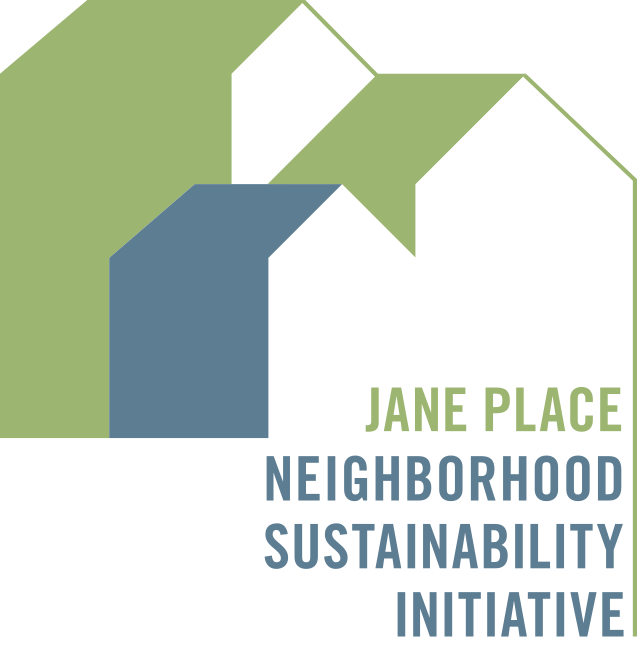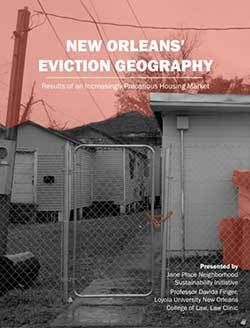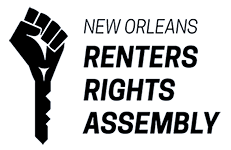The ongoing economic crisis certainly means that some renters who were previously not at risk of eviction are now struggling to pay rent, but the underlying systemic inequalities in New Orleans ensures that a disproportionate number of Black households will face eviction when courts reopen.
This is especially troubling considering the high rates of COVID-19 infection and mortality amongst Black residents in Orleans Parish. One of the neighborhoods with the highest COVID-19 infection rates is Little Woods, which JPNSI found had an eviction rate of 10.4%. Little Woods’ vulnerability to eviction, as well as its vulnerability to COVID-19, illustrates how systemic racism in the economy, the healthcare system, and the housing market amplifies risk and increases harm within predominantly Black communities.
JPNSI, in coalition with over 60 organizations, advocates that eviction courts remain closed in Orleans Parish in alignment with the federal Coronavirus Aid, Relief, and Economic Security (CARES) Act. Roughly 40% of evictions observed during monitoring were forbidden by the CARES Act, which prevents properties that participate in federal subsidy programs (such as the Housing Choice Voucher or “Section 8” program, public housing, Low Income Housing Tax Credit properties, and Permanent Supportive Housing) from evicting tenants until August 24, 2020. The CARES Act also protects renters who live in properties with federally backed mortgages, but it is nearly impossible for tenants to gain access to their landlord’s mortgage to check if they are protected.
Help! I'm Being Evicted: A Step by Step Guide for Renters is a comic book guide that offers tenants advice on what to do when they are facing an eviction notice: how to collect evidence, how to prepare for court, possible defenses against evictions, and more. It is meant to provide guidance during an often stressful time for tenants. Originally published in 2020, Spanish language and updated English versions were released in 2023.
More information about free legal assistance and how to protect yourself when facing eviction can be found on our Right to Counsel page.
Published in 2019, New Orleans' Eviction Geography: Results of an Increasingly Precarious Market, is the first comprehensive report on the escalating eviction crisis in New Orleans, and provides policy recommendations at the state and municipal level to lessen the amount of evictions. Evictions cause lasting damages to individuals and families, and are disproportionately impacting Black New Orleanians.
New Orleans is facing a growing displacement crisis. As the cost of living has increased, low-income families increasingly struggle to find stable, habitable, and affordable housing. Over the last 17 years, when controlling for inflation, rents have risen 49% while incomes have seen an 8% decrease in the same period. Incomes are not increasing at the same rate as housing costs, and rents continue to rise. Many neighborhoods are rapidly changing, racially and economically, and have become prohibitively expensive for the majority of the city’s residents.
While some residents might find themselves gradually priced out of a neighborhood, others face a more sudden kind of displacement: eviction. Displacement by eviction causes housing volatility, neighborhood instability, homelessness, financial stress, poverty, emotional distress and loss of hope. The eviction crisis in New Orleans is supported by an arcane legal regime that governs landlord-tenant matters in Louisiana that favor landlords over tenants. This structural arrangement perpetuates economic, social, racial, gender, and political inequality across the state.
The subject of evictions has been an under-analyzed aspect of New Orleans’ deepening housing crisis. Before now, data on evictions in New Orleans, and their impact on individuals and neighborhoods, has never been analyzed locally in a comprehensive way.
Report Findings
Our Recommendations
The clusters of evictions in neighborhoods, taken together with high rates of racial segregation, rent cost burdens, and histories of disinvestment, demonstrate how poverty, discriminatory housing practices, and lack of legal protections for renters have impeded the goal of building healthy communities for all New Orleanians. The following policies at the state and municipal levels should be implemented to address evictions and lessen some of the damages that eviction cause, both by preventing evictions and slowing down the process to allow tenants more time to pay rent or to locate replacement housing. These policies should be seen as the first steps to address the power disparities between landlords and tenants. Further action is necessary in order to truly address the magnitude of the crisis.
State Level
- Ten Day Grace Period for Renters with Unexpected Expenses.
Louisiana law allows landlords to file for an eviction the day after rent is due and even if a renter is a only a few dollars short. Similar to laws in Alabama and Mississippi, this provision would allow renters who are late on rent up to 10 days to pay in full before the courts get involved.
- Replace 10-day No Cause Evictions with a Standard 30-Day Notice.
Currently, landlords can file for a 10-day eviction for no cause against tenants on month to month leases. Thirty days is the national standard for no cause evictions. Given the deep housing crisis affecting New Orleans, tenants facing a 10-day eviction notice might struggle to find adequate and affordable replacement housing on such short notice.
- Ensure That 5-day Notice Really Means 5 Days, Not Immediate Eviction.
Most leases include clauses that waive the 5-day notice for an eviction. Most tenants are either not aware of the repercussions of that language, or do not feel comfortable asking their landlords to remove the language before signing a lease. This language should be prohibited.
- Judicial Flexibility for Tenants with Serious Hardships.
Judges should be allowed to delay eviction for up to seven days to prevent undue hardship on the tenant because of severe disability, serious illness, dangerous weather conditions, or other exceptional circumstances. Judges should be allowed to have some discretion on cases in their court.
Municipal Level
- Make Inclusionary Zoning Mandatory by Passing a Smart Housing Mix Policy.
A Smart Housing Mix Policy that includes mandatory inclusionary zoning would bring more units of affordable housing online by ensuring that market rate and luxury developments include a percentage of units affordable for the average New Orleanian. All income-restricted units that come online through inclusionary zoning should be permanently affordable, and should be targeted for households making 50% AMI or below. Our recommendations are for a set aside of 20% for affordable housing in private market developments.
- Pass the Healthy Homes Ordinance to Create a Rental Registry.
Poor rental housing conditions in New Orleans means thousands of families are living with mold, leaks, rats, and other hazards on a daily basis, with no real way to hold their slumlords accountable. Tenants will be protected from retaliation by their landlord if they submit a complaint.
- Increase Support for Permanently Affordable Housing Held in Community Land Trusts.
Community Land Trusts (CLTs) are a powerful tool to promote development without displacement, ensuring that housing for low- and moderate-income residents is preserved and protected for generations using a shared equity model. CLTs are a non-profit, community-based organizations that develop permanently affordable rental, homeownership, or commercial properties. The CLT retains ownership over the land while providing subsidies to help low- to moderate-income families rent or buy homes sited on the land. The relationship between the CLT and the homeowners and tenants protects the housing from market speculation due to resale restrictions.
Housing can only be occupied or sold to low or moderate-income residents, thus preserving and recycling any initial public money that went into the project. Housing developed by CLTs are removed from the market, protecting residents from speculation and gentrification occurring in the market. CLTs also have a strong track record of ensuring that CLT homeowners retain ownership during times of stress. During the 2008 housing crisis, homes with traditional mortgages went into foreclosure at eight times the rate of CLT homes. There are over two hundred CLTs operating across the U.S. which have collectively produced over 15,000 permanently affordable housing units.
-
Match Commercial STR Permits and Affordable Housing Units.
For existing and future commercially-zoned rental buildings, allow commercial Short Term Rental “STR” permits only if they are paired with affordable units under one of two options:
1. One-to-One Match with a Cap: Allow STR permits up to a cap of a certain percentage of the building’s total units (15%, 20%, 30%), but only if the building also holds a matching number of units affordable at 50% AMI.
2. One-to-Two Match with no Cap: Allow an unlimited number of STR permits per building, but only if the building also provides two units of housing affordable at 50% AMI for every one STR permit.





